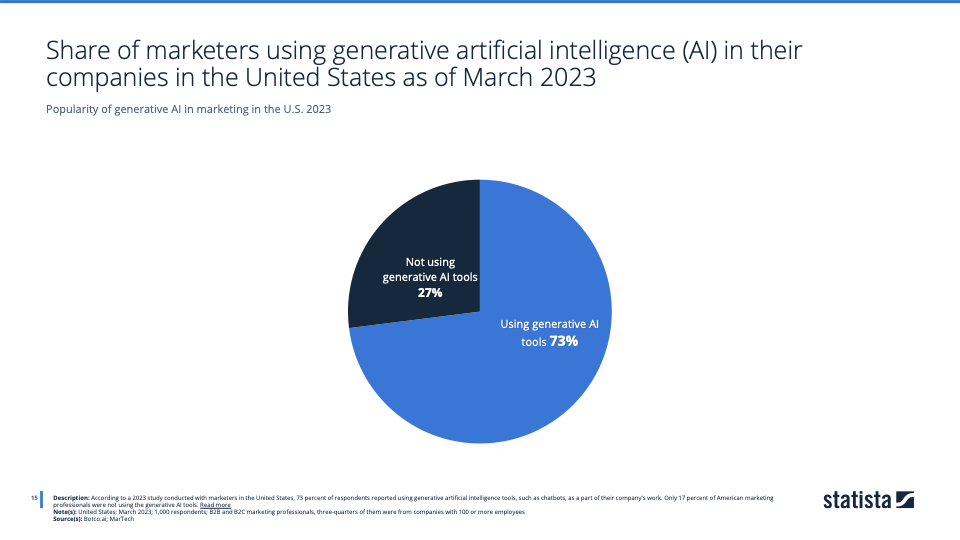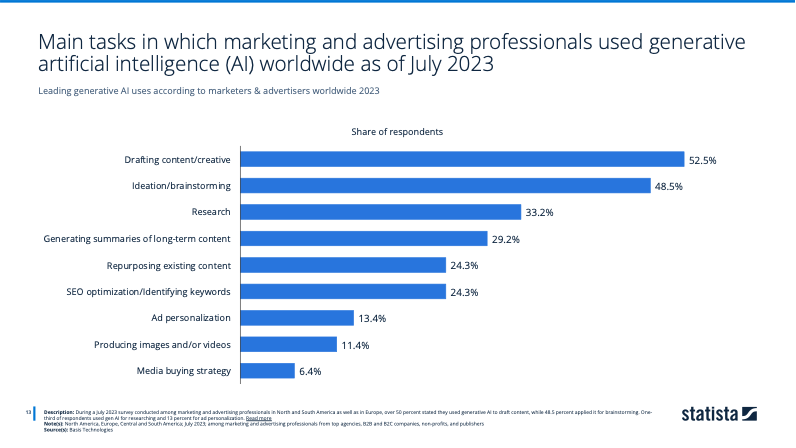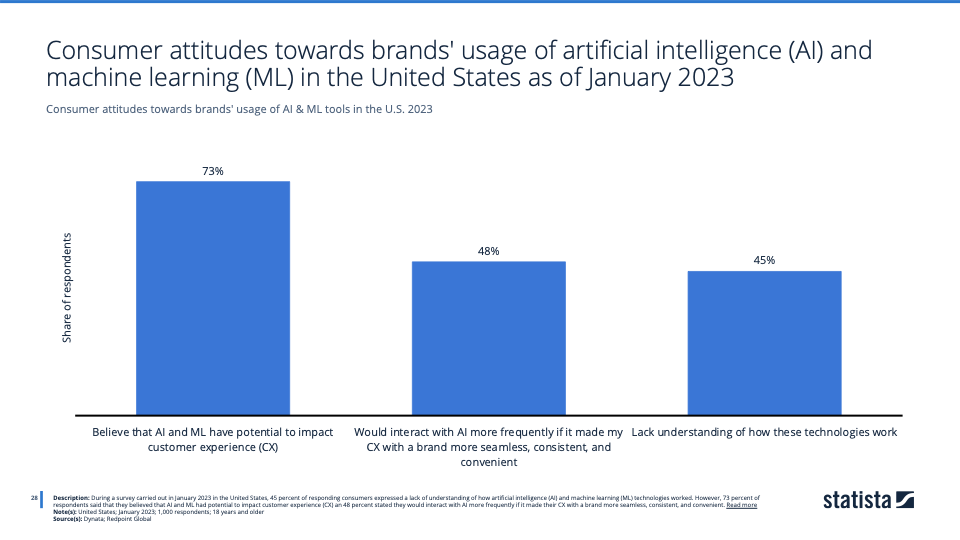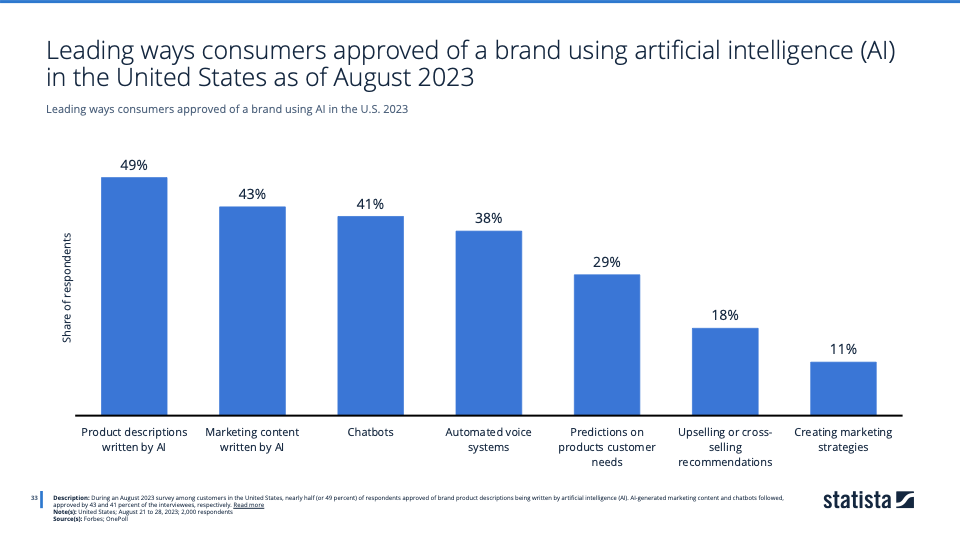Work Smarter, Not Harder: How AI Could Change Your Job
- Bryan Cruz
- Aug 20, 2024
- 4 min read

The question of whether AI will replace jobs or help us become more efficient in our roles is a relevant concern today. However, one thing is clear: AI is here to stay, much like previous technological breakthroughs such as Google, Napster, and Limewire. Just as we adapted to those innovations—eventually evolving into platforms like Google Ads, Google Analytics, Spotify, and Apple Music—AI has become part of our lives, with platforms like ChatGPT (OpenAI) leading the way.
But instead of asking if AI will take our jobs, the more important question is: How can AI benefit us? How can we improve it so that it serves us all? Many companies are already using AI to make their employees more productive, ultimately helping the business as a whole.
Marketers Embrace GenAI: Revolutionizing Content Creation and Creative Strategies
73% of marketers use GenAI in their companies. This highlights how AI is increasingly becoming a part of different aspects of marketing and advertising. The highest adoption is seen in content creation and ideation, indicating that AI is increasingly being used to enhance creativity and streamline the production of marketing materials.
Navigating the AI Challenge in Ad Evaluation: Why Balancing Human Insight is Key to Maximizing Creative Impact
A new problem arises when we integrate AI into ad evaluation and creative processes, according to Ipsos' recent research on AI and advertising. AI models might not accurately assess the complete impact and effectiveness of creative or unusual advertisements because they rely on prior data. Consequently, advertisements that could have generated significant revenue may be underestimated as compared to a human assessment. Conversely, AI may overstate the impact of some advertisements if it fails to take into account recent bad press or other contextual information that a person would find important. This highlights the need to balance AI with human insight to ensure that both creativity and effectiveness are maximized in marketing.
"...This highlights the need to balance AI with human insight to ensure that both creativity and effectiveness are maximized in marketing."
AI and Job Efficiency: Transforming the Workplace
AI is revolutionizing how businesses operate by automating repetitive tasks and accelerating decision-making processes. This isn’t about replacing people; it’s about freeing them to do their best work. When AI handles the mundane, employees can focus on high-impact activities that drive business success. For companies, this means more innovation, faster growth, and a competitive edge in the market.
Technology Evolution: Embrace the Future
Technological innovations will keep transforming industries and altering consumer expectations. Just as Google, Napster, and Limewire transformed the way we search for information and listen to music, AI is poised to redefine the way we work and live. The companies that thrive in this environment will be those that embrace AI, leveraging its capabilities to enhance their offerings, improve customer experiences, and stay ahead of the competition. 73% of consumers believe that AI has the potential to significantly impact customer experience.
49% of consumers said they approve the use of AI for brand's product descriptions and 43% said they approve AI for marketing content.
AI in the Workplace: A Strategic Asset
AI is rapidly becoming a crucial asset in the workplace, revolutionizing how companies handle tasks and make decisions. Data from Vividata (Winter 2024) indicates that 45% of individuals who changed jobs in the past year struggled to complete their daily tasks, highlighting the presence of time-consuming and manual processes. By integrating AI into their operations, businesses can streamline workflows and improve overall efficiency. Based on Statista, 52% of marketers use AI to streamline their processes. This AI allows marketers and employees to focus on what they do best—strategic thinking, creativity, and customer engagement—driving greater value for the company and its clients.
Human Motivation and Job Satisfaction: The Real ROI
According to Vividata (Winter 2024), 42% of people who changed jobs in the past year feel less motivated than they did a year ago. This decline in motivation underscores the need for a shift in how work is approached. As AI increasingly takes over mundane tasks, it offers a valuable opportunity for employees to focus on work that brings a greater sense of accomplishment and purpose.
Furthermore, while financial incentives are important, money isn't always the best motivator—after all, "money can't buy happiness." The real return on investment comes from a motivated and engaged workforce. AI facilitates this by handling routine tasks, which allows employees to focus on more meaningful and fulfilling work. This alignment between personal satisfaction and business goals not only boosts productivity but also fosters a workplace culture where innovation and creativity can truly thrive.
"...the real return on investment comes from a motivated, engaged workforce."
Adapting to the AI-Driven Market: Opportunities for Growth
As AI transforms the job market, it brings both challenges and opportunities. While some roles may evolve or disappear, new prospects are emerging. Progressive companies and professionals are already harnessing AI to drive innovation, develop new products, and launch businesses that leverage this powerful technology. The future will be shaped by those who can adapt and utilize AI to fuel growth and achieve success.
Sources:
Ipsos - AI in Advertising Research
McKinsey & Company - Jobs lost, jobs gained: What the future of work will mean for jobs, skills, and wages
Vividata Winter 2024












Comments